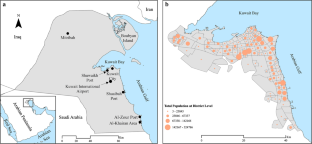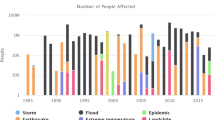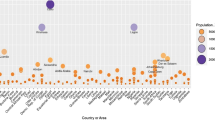Abstract
Climate change is expected to be severe in many countries, mainly in arid countries such as Kuwait. Thus, assessing the vulnerability of these countries is fundamental in designing mitigation and adaptation plans. In this study, a qualitative approach was used to conduct a climate change vulnerability assessment (CCVA) targeting Kuwait’s most impacted sectors: marine and fisheries, water resources, land management, and health. Increasing sea surface temperature and seawater salinity significantly affect the marine and fisheries sectors; the consequences are very complicated and interconnected with water resources. Mitigation and adaptation options to these stressors are minimal. In the land management sector, establishing adaptive land-use policies will minimize the impact of sea-level rise, land degradation, and floods. Increasing dust storm events and heat waves have a diverse effect on public health. The CCVA framework efficiently revealed the interrelationships among the studied sectors and can be applied to design CCVAs for other countries.





Similar content being viewed by others
References
Abahussain AA, Abdu AS, Al-Zubari WK, El-Deen NA, Abdul-Raheem M (2002) Desertification in the Arab region: analysis of current status and trends. J Arid Environ 51(4):521–545. https://doi.org/10.1006/jare.2002.0975
Abotalib M, Jacob J, Alhamadi H, Alkandari D (2021) The environmental life cycle assessment of different electricity options in Kuwait. J Eng Res [Internet] [accessed 2022 Nov 29] 9(2):308–319. https://doi.org/10.36909/jer.v9i2.9853
Achilleos S, Al-Ozairi E, Alahmad B, Garshick E, Neophytou AM, Bouhamra W, Yassin MF, Koutrakis P (2019) Acute effects of air pollution on mortality: a 17-year analysis in Kuwait. Environ Int 126:476–483. https://doi.org/10.1016/J.ENVINT.2019.01.072
Al-Awadhi JM, Misak R (2000) Field assessment of aeolian sand processes and sand control measures in Kuwait. Kuwait J Sci Eng 27(1):158–176
Al-Awadhi JM, Omar SA, Misak RF (2005) Land degradation indicators in Kuwait. L Degrad Dev 16(2):163–176. https://doi.org/10.1002/ldr.666
Al-Damkhi AM, Khuraibet AM, Al-Attar FAH, Abdul-Wahab SA (2008) Integrating environmental impact assessment within Kuwait master plans as a tool for human and ecological risk control. Hum Ecol Risk Assess. https://doi.org/10.1080/10807030802387846
Al-Dousari A, Doronzo D, Ahmed M (2017) Types, indications and impact evaluation of sand and dust storms trajectories in the Arabian Gulf. Sustain 9(9):1–14. https://doi.org/10.3390/su9091526
Al-Dousari AM, Alsaleh A, Ahmed M, Misak R, Al-Dousari N, Al-Shatti F, Elrawi M, William T (2019) Off-road vehicle tracks and grazing points in relation to soil compaction and land degradation. Earth Syst Environ 3(3):471–482. https://doi.org/10.1007/s41748-019-00115-y
Al-Dousari A, Ramadan A, Al-Qattan A, Al-Ateeqi S, Dashti H, Ahmed M, Al-Dousari N, Al-Hashash N, Othman A (2020) Cost and effect of native vegetation change on aeolian sand, dust, microclimate and sustainable energy in Kuwait. J Taibah Univ Sci [Internet] 14(1):628–639. https://doi.org/10.1080/16583655.2020.1761662
Al-Harbi M, Eidan H, Al-Holan N, Al-Abdullrazaq F, Alsahli M, Hassan A, Altheyabi N, Ramadan E, Aldashti H, Alnassar M, Aldousiri A, Alhazeem S, Bahzad J, Gholoum M, Alshatti A, Lujain Saidan M, Hussein S (2018) The second national communication report: vulnerability and adaptation to climate change. Kuwait Environmental Public Authority
Al-Hemoud A, Gasana J, Al-Dabbous AN, Al-Shatti A, Al-Khayat A (2018) Disability adjusted life years (Dalys) in terms of years of life lost (yll) due to premature adult mortalities and postneonatal infant mortalities attributed to pm2.5 and pm10 exposures in Kuwait. Int J Environ Res Public Health 15(11):1–15. https://doi.org/10.3390/ijerph15112609
Al-Hemoud A, Gasana J, Al-Dabbous A, Alajeel A, Al-Shatti A, Behbehani W, Malak M (2019) Exposure levels of air pollution (PM2.5) and associated health risk in Kuwait. Environ Res 179:108730. https://doi.org/10.1016/J.ENVRES.2019.108730
Al-Hemoud A, Al-Enezi A, Al-Dashti H, Petrov P, Misak R, AlSaraf M, Malek M (2023) Hazard assessment and hazard mapping for Kuwait. Int J Disaster Risk Sci [Internet] [accessed 2023 Jun 8] 14(1):143–161. https://doi.org/10.1007/S13753-023-00473-2/FIGURES/12
Al-Husaini M, Bishop JM, Al-Foudari HM, Al-Baz AF (2015) A review of the status and development of Kuwait’s fisheries. Mar Pollut Bull 100(2):597–606. https://doi.org/10.1016/j.marpolbul.2015.07.053
Al-Muqdadi SWH (2019) Developing strategy for water conflict management and transformation at Euphrates–Tigris basin. Water 11:2037. https://doi.org/10.3390/W11102037
Al-Mutairi N, Alsahli M, El-Gammal M, Ibrahim M, Samra RA (2021) Environmental and economic impacts of rising sea levels: a case study in Kuwait’s coastal zone. Ocean Coast Manag [Internet] 205:105572. https://doi.org/10.1016/j.ocecoaman.2021.105572
Al-Qallaf H, Aliewi A, Abdulhadi A (2020) Assessment of the effect of extreme rainfall events on temporal rainfall variability in Kuwait. Arab J Geosci 13(21). https://doi.org/10.1007/s12517-020-06086-z
Al-Rashidi TB, El-Gamily HI, Amos CL, Rakha KA (2009) Sea surface temperature trends in Kuwait Bay, Arabian Gulf. Nat Hazards. https://doi.org/10.1007/s11069-008-9320-9
Al-Said T, Al-Ghunaim A, Subba Rao DV, Al-Yamani F, Al-Rifaie K, Al-Baz A (2017) Salinity-driven decadal changes in phytoplankton community in the NW Arabian Gulf of Kuwait. Environ Monit Assess 189(6). https://doi.org/10.1007/s10661-017-5969-4
Al-Shayji K, Aleisa E (2018) Characterizing the fossil fuel impacts in water desalination plants in Kuwait: a life cycle assessment approach. Energy 158:681–692. https://doi.org/10.1016/J.ENERGY.2018.06.077
AL-Yamani F, Bishop J, Ramadhan E, AL-Husaini M, Al-Ghadban AN (2004) Physico-chemical Characteristics and Biological Oceanography of Kuwait’s Waters. In Oceanographic Atlas of Kuwait’s Waters. Kuwait Institute for Scientific Research, pp 93–95
Al-Yamani F, Polikarpov I, Saburova M (2021) In: Jawad LA (ed) Northern Gulf marine biodiversity in relevance to the river discharge BT - Southern Iraq’s marshes: their environment and conservation [Internet]. Springer International Publishing, Cham, pp 379–437. https://doi.org/10.1007/978-3-030-66238-7_20
Al-Zubari W, Al-Turbak A, Zahid W, Al-Ruwis K, Al-Tkhais A, Al-Muataz I, Abdelwahab A, Murad A, Al-Harbi M, Al-Sulaymani Z (2017) An overview of the GCC unified water strategy (2016–2035). Desalin Water Treat 81:1–18. https://doi.org/10.5004/dwt.2017.20864
Alahmad B, Shakarchi AF, Khraishah H, Alseaidan M, Gasana J, Al-Hemoud A, Koutrakis P, Fox MA (2020) Extreme temperatures and mortality in Kuwait: who is vulnerable? Sci Total Environ 732:139289. https://doi.org/10.1016/j.scitotenv.2020.139289
Albahar S, Li J, Al-Zoughool M, Al-Hemoud A, Gasana J, Aldashti H, Alahmad B (2022) Air pollution and respiratory hospital admissions in Kuwait: The Epidemiological Applicability of Predicted PM2.5 in Arid Regions. Int J Environ Res Public Health 19(10). https://doi.org/10.3390/ijerph19105998
Aldosari D, Almedeij J, Alsumaiei AA (2020) Update of intensity–duration–frequency curves for Kuwait due to extreme flash floods. Environ Ecol Stat [Internet] 27(3):491–507. https://doi.org/10.1007/s10651-020-00454-4
Aldousari EA, Alsahli MMM (2017) Studying the spatial distribution of asthma patients in the state of Kuwait using GIS. J Soc Sci 45(1):11–35
Alghais N (2019) Evaluation of the impacts of lack of geoinformation data in crisis management during the 2018 Kuwait flood. Int Arch Photogramm Remote Sens Spat Inf Sci - ISPRS Arch 42(3/W8):17–24. https://doi.org/10.5194/isprs-archives-XLII-3-W8-17-2019
Alghais N, Pullar D (2018) Modelling future impacts of urban development in Kuwait with the use of ABM and GIS. Trans GIS 22(1):20–42. https://doi.org/10.1111/tgis.12293
Aliewi A, Alomirah H (2020) Assessment of the significance of water-energy-food nexus for Kuwait BT. In: Kumar M, Munoz-Arriola F, Furumai H, Chaminda T (eds) Resilience, response, Risk Water Syst shifting manag nat Forcings paradig [Internet]. Springer Singapore, Singapore, pp 357–367. https://doi.org/10.1007/978-981-15-4668-6_19
Aliewi A, El-Sayed E, Akbar A, Hadi K, Al-Rashed M (2017) Evaluation of desalination and other strategic management options using multi-criteria decision analysis in Kuwait. Desalination 413:40–51. https://doi.org/10.1016/j.desal.2017.03.006
Aliewi A, Al-Kandari J, Al-Khalid A, Bhandary H, Al-Qallaf H (2021) Modelling the effect of high level of total dissolved solids (TDS) for the sustainable utilization of brackish groundwater from saline aquifers in Kuwait. Environ Dev Sustain [Internet] 23(2):2204–2223. https://doi.org/10.1007/s10668-020-00670-9
Almutairi NS (2016) Causes of delays on construction projects in Kuwait according to opinion of engineers working in Kuwait. IJERA Journal 6:84–96
Alolayan MA, Brown KW, Evans JS, Bouhamra WS, Koutrakis P (2013) Source apportionment of fine particles in Kuwait City. Sci Total Environ 448:14–25. https://doi.org/10.1016/J.SCITOTENV.2012.11.090
Alosairi Y, Pokavanich T (2017) Seasonal circulation assessments of the Northern Arabian/Persian Gulf. https://doi.org/10.1016/j.marpolbul.2016.12.065. Mar Pollut Bull
Alotaibi S (2011) Energy consumption in Kuwait: prospects and future approaches. Energy Policy [Internet] 39(2):637–643. https://doi.org/10.1016/j.enpol.2010.10.036
AlSabah R, Refaat O (2019) Assessment of construction risks in public projects located in the state of Kuwait. J Eng Res [Internet] [accessed 2022 Nov 3] 7(3). https://kuwaitjournals.org/jer/index.php/JER/article/view/4757
Alsahli MMM (2009) Characterizing surface temperature and clarity of Kuwait’s seawaters using remotely sensed measurements and GIS analyses [Internet]. [place unknown]: the University of Kansas. http://hdl.handle.net/1808/5969
Alsahli MM, Al-Harbi M (2018) Allocating optimum sites for air quality monitoring stations using GIS suitability analysis. Urban Clim. https://doi.org/10.1016/j.uclim.2017.11.001
Alsahli MMM, AlHasem AM (2016) Vulnerability of Kuwait coast to sea level rise. Geogr Tidsskr J Geogr [Internet] 116(1):56–70. https://doi.org/10.1080/00167223.2015.1121403
Bauman AG, Feary DA, Heron SF, Pratchett MS, Burt JA (2013) Multiple environmental factors influence the spatial distribution and structure of reef communities in the northeastern Arabian Peninsula. Mar Pollut Bull 72(2):302–312. https://doi.org/10.1016/j.marpolbul.2012.10.013
Bercht AL (2021) How qualitative approaches matter in climate and ocean change research: uncovering contradictions about climate concern. Glob Environ Chang 70:102326. https://doi.org/10.1016/J.GLOENVCHA.2021.102326
Bhandary H, Sabarathinam C, Al-Khalid A (2018) Occurrence of hypersaline groundwater along the coastal aquifers of Kuwait. Desalination 436(October 2017):15–27. https://doi.org/10.1016/j.desal.2018.02.004
Clarke L, Jiang K, Akimoto K, Babiker M, Blandford G, Fisher Vanden K, Hourcade J-C, Krey V, Kriegler E, Löschel A et al (2014) Chapter 6 - assessing transformation pathways. In: Chen W, Weyant J (eds) Clim Chang 2014 Mitig Clim Chang Contrib Work Gr III to Fifth assess Rep Inter- Gov Panel Clim Chang [Internet]. Cambridge University Press;, Cambridge, United Kingdom, pp 413–510. [accessed 2022 Nov 21] https://www.ipcc.ch/site/assets/uploads/2018/02/ipcc_wg3_ar5_chapter6.pdf
De Bruin K, Dellink RB, Ruijs A, Bolwidt L, Van Buuren A, Graveland J, De Groot RS, Kuikman PJ, Reinhard S, Roetter RP et al (2009) Adapting to climate change in the Netherlands: an inventory of climate adaptation options and ranking of alternatives. Clim Change. https://doi.org/10.1007/s10584-009-9576-4
Dudley AL, Meza I, Naumann G, Hagenlocher M (2022) Do global risk assessments leave countries behind? How the selection of countries influences outcomes of drought risk assessments. Clim Risk Manag [Internet] [accessed 2022 Sep 7] 37:100454. https://doi.org/10.1016/J.CRM.2022.100454
Fakhruddin BSHM, Boylan K, Wild A, Robertson R (2019) Assessing vulnerability and risk of climate change. In: SILLMANN J, SIPPEL S, RUSSO S (eds) Clim Extrem their implic impact risk assess. Elsevier, Amsterdam, Netherlands, pp 217–241. https://doi.org/10.1016/B978-0-12-814895-2.00012-4
Füssel HM, Klein RJT (2006) Climate change vulnerability assessments: an evolution of conceptual thinking. Clim Change 75(3):301–329. https://doi.org/10.1007/s10584-006-0329-3
Geravandi S, Sicard P, Khaniabadi YO, De Marco A, Ghomeishi A, Goudarzi G, Mahboubi M, Yari AR, Dobaradaran S, Hassani G et al (2017) A comparative study of hospital admissions for respiratory diseases during normal and dusty days in Iran. Environ Sci Pollut Res. https://doi.org/10.1007/s11356-017-9270-4
Ghazanfar SA, Böer B, Al Khulaidi AW, El-Keblawy A, Alateeqi S (2019) Plants of Sabkha ecosystems of the Arabian Peninsula. In: Gul B, Böer B, Khan MA, Clüsener-Godt M, Hameed A (eds) Sabkha Ecosyst vol VI Asia/Pacific [Internet]. Springer International Publishing, Cham, pp 55–80. https://doi.org/10.1007/978-3-030-04417-6_5
Gorai AK, Tuluri F, Tchounwou PB (2014) A GIS based approach for assessing the association between air pollution and asthma in New York State, USA. Int J Environ Res Public Health. https://doi.org/10.3390/ijerph110504845
Gueymard CA, Al-Rasheedi M, Ismail A, Hussain T (2017) Long-term variability of aerosol optical depth, dust episodes, and direct normal irradiance over Kuwait for CSP applications. ISES Sol World Congr 2017 - IEA SHC Int Conf Sol Heat Cool Build Ind 2017, Proc.(December 2018):75–84. https://doi.org/10.18086/swc.2017.04.04
Gulseven O (2016) Forecasting population and demographic composition of Kuwait until 2030. Int J Econ Finan Issues 6(4):1429–1435
Hawchar L, Naughton O, Nolan P, Stewart MG, Ryan PC (2020) A GIS-based framework for high-level climate change risk assessment of critical infrastructure. Clim Risk Manag 29. https://doi.org/10.1016/j.crm.2020.100235
Hoegh-Guldberg O, Mumby PJ, Hooten AJ, Steneck RS, Greenfield P, Gomez E, Harvell CD, Sale PF, Edwards AJ, Caldeira K et al (2007) Coral reefs under rapid climate change and ocean acidification. Science. https://doi.org/10.1126/science.1152509
Huang J, Ji M, Xie Y, Wang S, He Y, Ran J (2016) Global semi-arid climate change over last 60 years. Clim Dyn [Internet] [accessed 2022 Nov 3] 46(3–4):1131–1150. https://doi.org/10.1007/s00382-015-2636-8
Ibrahim HD, Eltahir EAB (2019) Impact of brine discharge from seawater desalination plants on Persian/Arabian Gulf Salinity. J Environ Eng 145(12):1–12. https://doi.org/10.1061/(asce)ee.1943-7870.0001604
KEPA (2017) eMISK - environmental atlas of the state of Kuwait [Internet]. [accessed 2022 Nov 2]. https://enterprise.emisk.org/env-atlas/en/
KEPA (2019a) State of Kuwait Second National Communication [Internet]. Kuwait City, Kuwait. https://epa.org.kw/Portals/0/PDF/StateOfKuwaitSecondEN.pdf
KEPA (2019b) Climate change mitigation and adaptation workshop held on the third floor of the Kuwait Environmental Public Authority (KEPA) building
Khadadah M (2013) The cost of asthma in Kuwait. Med Princ Pract 22(1):87–91. https://doi.org/10.1159/000341154
Khalaf FI, Al-Saleh S, Al-Houty F, Ansari L, Shublaq W (1979) Mineralogy and grain size distribution of dust fallout in Kuwait. Atmos Environ 13(12):1719–1723. https://doi.org/10.1016/0004-6981(79)90334-2
Kim Y, Calzada A, Scott O, Zermoglio F (2018) Designing climate vulnerability assessments. United States Agency for International Development, Washington, DC. https://www.climatelinks.org/projects/atlas
Kuwait Meteorological Department (2019) Climatological data of international Kuwait airport station from 2007 to 2016. Kuwait Meteorological Department of the Directorate General of Civil Aviation, Kuwait. https://www.met.gov.kw/
Lam VWY, Cheung WWL, Reygondeau G, Rashid Sumaila U (2016) Projected change in global fisheries revenues under climate change. Sci Reports 6(1):1–8. https://doi.org/10.1038/srep32607
Lasage R, Verburg PH (2015) Evaluation of small scale water harvesting techniques for semi-arid environments. J Arid Environ 118:48–57. https://doi.org/10.1016/J.JARIDENV.2015.02.019
Latcharote P, Al-Salem K, Suppasri A, Pokavanich T, Toda S, Jayaramu Y, Al-Enezi A, Al-Ragum A, Imamura F (2018) Tsunami hazard evaluation for Kuwait and Arabian Gulf due to Makran Subduction Zone and Subaerial landslides. Nat Hazards 93:127–152. https://doi.org/10.1007/s11069-017-3097-7
Maliva R (2021) Sea level rise and groundwater. Springer International Publishing, Cham, pp 113–153. https://doi.org/10.1007/978-3-030-66813-6_6. In: Clim Chang Groundw Plan Adapt a Chang Uncertain Futur WSP Methods Water Resour Eval Ser No 6 [Internet]
McNeeley SM, Even TL, Gioia JBM, Knapp CN, Beeton TA (2017) Expanding vulnerability assessment for public lands: the social complement to ecological approaches. Clim Risk Manag 16:106–119. https://doi.org/10.1016/j.crm.2017.01.005
Mengist W, Soromessa T, Legese G (2020) Method for conducting systematic literature review and meta-analysis for environmental science research. MethodsX 7:100777. https://doi.org/10.1016/J.MEX.2019.100777
MEW (2022) Statistical year book: water. Kuwait
Mohammad ER, Al-Dashti H, Aldosari A, AlNassar M (2018) Vulnerability and adaptation: climatic conditions. In: Al-Harbi M (ed) Vulnerability adapt to Clim Chang team Rep. Kuwait Environment Public Authority, Kuwait, pp 1–10
Omar F (2022) Kuwait’s outdoor labor ban: 730 violations in June. Kuwait Times [Internet]. [accessed 2022 Nov 3]. https://www.kuwaittimes.com/kuwaits-outdoor-labor-ban-730-violations-in-june/
Omar Asem S, Roy WY (2010) Biodiversity and climate change in Kuwait. Int J Clim Chang Strateg Manag 2(1):68–83. https://doi.org/10.1108/17568691011020265
PACI (2019) Kuwait demographic data of 2019 - The Public Authority for Civil Information [Internet]. Kuwait. https://www.paci.gov.kw/stat/
Pal JS, Eltahir EAB (2015) Future temperature in southwest Asia projected to exceed a threshold for human adaptability. Nat Clim Chang 6(2):197–200. https://doi.org/10.1038/nclimate2833
Sabarathinam C, Bhandary H, Al-Khalid A (2019) A geochemical analogy between the metal sources in Kuwait Bay and territorial sea water of Kuwait. Environ Monit Assess [Internet] [accessed 2022 Dec 11] 191(3):1–19. https://doi.org/10.1007/s10661-019-7219-4
Sabbah I, Al-Mudhaf HF, Al-Kandari A, Al-Sharifi F (2012) Remote sensing of desert dust over Kuwait: long-term variation. Atmos Pollut Res [Internet] 3(1):95–104. https://doi.org/10.5094/APR.2012.009
Sebastian M, Kaaya LT (2018) Impacts of Sea Surface temperature on Coral Reefs in Mafia Island, Tanzania. J Mar Sci Res Dev 8(3):5
Segar DA (2018) Chapter 12: Foundation of life in the oceans. Introd to Ocean Sci. [place unknown]
Sousa DS, Neves CF, Silva HVO, Schaffel SB, Luigi G, La Rovere EL (2022) A systemic approach for climate risk assessment applied to thermoelectric power plants in northeastern coast of Brazil. Clim Risk Manag [Internet] 36:100424. https://doi.org/10.1016/j.crm.2022.100424. May 2021
Stocker TF, Qin D, Plattner GK, Tignor MMB, Allen SK, Boschung J, Nauels A, Xia Y, Bex V, Midgley PM (2013) Climate change 2013 the physical science basis: Working Group I contribution to the fifth assessment report of the intergovernmental panel on climate change. Clim Chang 2013 Phys Sci Basis Work Gr I Contrib to Fifth Assess Rep Intergov Panel Clim Chang 9781107057999:1–1535. https://doi.org/10.1017/CBO9781107415324
Uddin S, Al Ghadban AN, Khabbaz A (2011) Localized hyper saline waters in Arabian Gulf from desalination activity-an example from South Kuwait. Environ Monit Assess 181(1–4):587–594. https://doi.org/10.1007/s10661-010-1853-1
Water F (2022) Water resources in Kuwait - Fanack Water [Internet]. [accessed 2022 Dec 10]. https://water.fanack.com/kuwait/water-resources-in-kuwait/#_ftn11
WBG (2021) World Bank Group. Washington, DC 20433. https://doi.org/10.1596/978-1-4648-0484-7_world_bank_group
WHO (2022) Asthma [Internet]. [accessed 2023 Jan 6]. https://www.who.int/news-room/fact-sheets/detail/asthma
Younis M, Al-Hajeri M, Celik Y, Kisa A, Richard P, Parkash J (2015) Healthcare of aging population of Kuwait. Ageing Int 40(1):36–43. https://doi.org/10.1007/s12126-012-9151-6
Acknowledgements
The authors would like to thank Ms. Anfal Alenezi for her valuable support in the interviews, the Kuwait Environmental Public Authority (KEPA) for hosting the workshop and participating in the interviews (especially the Coastal and Desertification Monitoring Department employees), the Public Authority for Civil Information (PACI) for providing the demographic data, and the United Nations Development Programme (UNDP) for their support. The authors would also like to express their gratitude to Eng. Fatin Al-Tamimi from the Ministry of Electricity, Water and Renewable Energy for the invaluable information about the desalination plant operations and issues.
Author information
Authors and Affiliations
Corresponding author
Ethics declarations
Conflict of interest
The authors declare no competing interests.
Additional information
Communicated by Zhihua Zhang.
Publisher’s Note
Springer Nature remains neutral with regard to jurisdictional claims in published maps and institutional affiliations.
Electronic supplementary material
Below is the link to the electronic supplementary material.
Rights and permissions
Springer Nature or its licensor (e.g. a society or other partner) holds exclusive rights to this article under a publishing agreement with the author(s) or other rightsholder(s); author self-archiving of the accepted manuscript version of this article is solely governed by the terms of such publishing agreement and applicable law.
About this article
Cite this article
Alsahli, M.M.M., Alkandary, D.S. Climate change vulnerability of Kuwait: a cross-sectoral assessment. Arab J Geosci 17, 183 (2024). https://doi.org/10.1007/s12517-024-11992-7
Received:
Accepted:
Published:
DOI: https://doi.org/10.1007/s12517-024-11992-7




